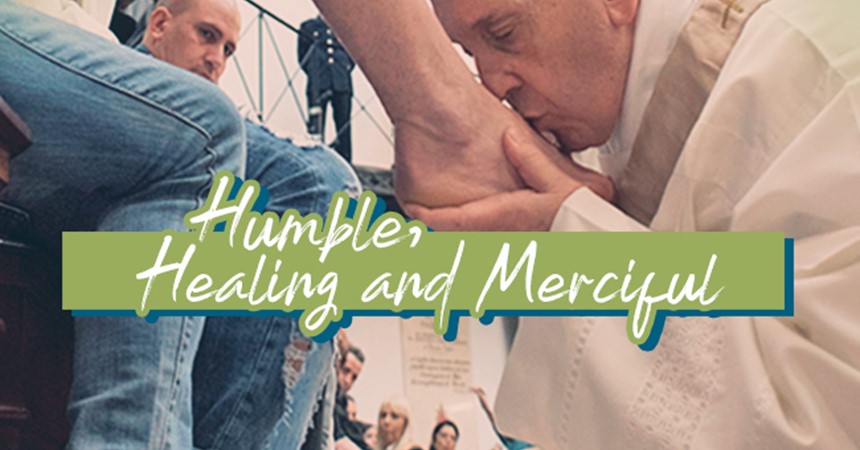The fruits of what is discerned during this time will help shape the agenda of the first session of Plenary Council in October 2020.
Each week, a snapshot report will be released by the Plenary Council Facilitation Team, showing the responses that lead to the development of each theme.
The fourth snapshot report centres on:
How is God calling us to be a Christ-centred Church that is humble, healing and merciful?
“By the tender mercy of our God, the dawn from on high will break upon us, to give light to those who sit in darkness and in the shadow of death, to guide our feet into the way of peace” (Luke 1:78-79)
This National Theme for Discernment is inspired by the voices of the People of God who expressed a deep and faith-filled trust in God and a need for lament and healing within the Church, acknowledging the sexual abuse crisis as a turning point for the Church in Australia. It identified the need for relationship and reconciliation among many within the Catholic community, and with the wider Australian society, particularly with Australia’s First Peoples and with all of creation. A desire was expressed for stronger prayer and sacramental life and more effective outreach to those who seek healing, as a renewed openness to and sign of God’s mercy.
What did people talk about?
People spoke about a number of different topics in phase 1: listening & dialogue. A comprehensive report on all the voices of participants will be released on July 28, 2019.
Below are some of the topics that informed this particular theme, which was created through a combination of analysis, discernment and prayer.

A snapshot of responses to the question: What do you think God is asking of us in Australia at this time?
“In Australia we still have a big divide between Indigenous brothers and the rest of us. The Church needs to take a leading role in building reconciliation by adopting positive gestures that enhance and challenge this overdue reconciliation”.
“Discern how to engage and bring to active faith those parents who send their children to Catholic schools but are not churchgoers. Discern how to engage and bring to active faith the many people who attend Mass at Easter and Christmas or for Baptisms, but not otherwise”.
“We’re living in the wake of the greatest possible disaster that could have descended upon the Church in this country—the sexual abuse crisis. Firstly, I think God wants every possible effort to be directed towards offering assistance to victims of abuse in the Church. Secondly, I think that God wants us as a Church collective to hang our head in shame”.
“Divorce is never wanted or planned for and, in some cases, necessary for the safety and wellbeing of the individuals involved. The Church should not turn their backs on them as this denies their dignity and makes them less equal than their peers”.
“God is asking us to do something about the clericalism and subsequent abuse arising from this misuse of power. He is asking us to remember and come to know Jesus and to live as He did”.
A snapshot of responses to the question: What questions do you have about the future of Australia that you would like the Plenary Council to consider?
“How does the Church plan to address the issue of sex offenders within the Church and how will it support its victims?”
“Can we decrease authority in Church hierarchy and give some authority to the people?”
“How do we use Church resources for service to the poor?”
“How can we work to be more welcoming, inclusive, open, kind, loving, forgiving, compassionate, listening, and so build a ‘home/community’ Church for all, not just an institutional one?”
“How can we make the Church more inclusive of divorced and remarried, LGBTIQ, people with a disability, including the mentally ill, those who have been damaged by abuse in the Church—emotional, spiritual, physical and sexual abuse?”
A snapshot of your stories of faith
Genni, Bunbury
As a small group we are cradle Catholics with a strong faith base and love of God, but a floundering confidence in the institution that is the present Catholic Church. We want the Church to move forward to reflect a contemporary outreach while still upholding the high moral values with regards to abortion, euthanasia and the sanctity of marriage for example. We seek to see the Church open its eyes to the needs in the communities in which we live. For example, abolish the “clericalism” attitude of some clergy that causes division and lack of inclusiveness. Our personal experience has seen the Baptism of four babies by a paedophile priest while a former priest in a parish community is deemed unworthy of his priesthood (because he married), but he had been a major positive influence in the day-to-day care of the parish community.
Benjamin, Armidale
To have the courage to let go the trappings of clericalism. To let go of elitism and exclusion. To embrace the downtrodden, the heart broken, the marginalised. For us to contemplate, how each of us may serve the Other? How may we tear down boundaries and take action to walk with others – to show mercy, to forgive, to love. To lead the way in bringing light to darkness – to take action in living-love in all things. To contemplate and act holistically – in our spiritual, social, political, environmental lives.
Ruth, Sandhurst
The sexual abuse scandal, the anti-gay marriage rhetoric, the patriarchal nature of governance and the attitude towards contraception has made it impossible for [my children] to remain active participants. All of my children are strong advocates for social justice and they applaud the Australian bishops for their stance on offshore detention and other issues such as climate change. However, the Church in Australia must engage with the other issues mentioned if it is to have a hope of retaining educated women within the ranks of its faithful. As a teacher in a Catholic school, I find the only way to recontextualise my faith so that it has relevance to my students is through social justice. I continually promote Caritas and all its wonderful work but I despair at times for the future of my parish and the Church in Australia as a whole.
Please note this report contains only a snapshot of thousands of stories and responses shared. A comprehensive report on the voices of participants will be released on July 28, 2019.
READ: Snapshot Report 1 – Missionary and evangelising
READ: Snapshot Report 2 – Inclusive, participatory and synodal
READ: Snapshot Report 3 – Prayerful and Eucharistic
More information on the National Themes for Discernment can be found on the Plenary Council website: www.plenarycouncil.catholic.org.au
With thanks to the Plenary Council.

